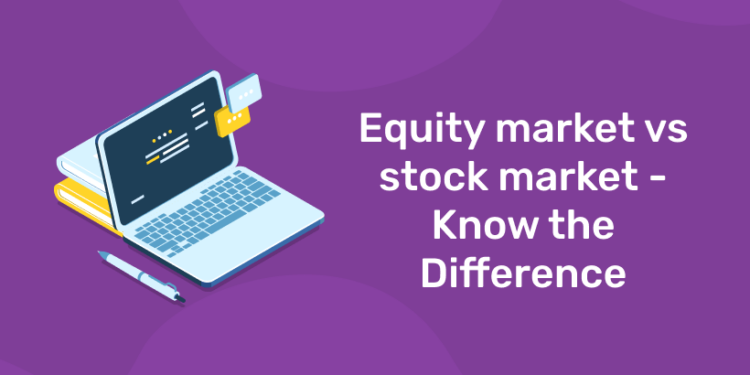The words equity market and stock market are interchangeable. Both terms apply to the acquisition and selling of ownership shares in public businesses via any of the numerous stock exchanges and over-the-counter markets in the United States and around the globe. A share of a stock reflects a company’s equity stake. That is, the investor purchases an interest in the business with the anticipation of getting a portion of its earnings in the form of distributions or profiting from the increase in the stock price, or both.
An equity market is a market in which company shares are distributed and sold, either on exchanges or over the counter. It is one of the most important aspects of a market economy and is also known as the stock market. It provides businesses with money to expand their operations and investors with a stake in a company with the potential to profit from their investment based on the company’s future success.
A stock market is where purchasers and sellers of stocks, also referred to as shares, who reflect ownership rights on companies, come together. These could include shares of private businesses offered to investors through equity crowdsourcing platforms, assets posted on a public stock market, and stock that is only exchanged secretly. Investments are frequently made with a financial strategy in view.
Master stock trading with us. Get a free demo!
Equity Market
An equity market is a venue that enables businesses to collect money from various investors. As a result, a business distributes stocks, which investors or dealers buy in the hope of profiting from future purchases of the stock. The stock market and equity market share the same objective of enabling stock dealing and are frequently used equally. Nonetheless, stock markets include over-the-counter trading platforms in addition to exchanges. As a result, equity markets serve as a venue for both over-the-counter private equities and public stocks published on exchanges such as the BSE, NSE, and others.
Types of Equity Market
Equity markets include organized trading and investment and are divided into two platforms: Primary and secondary markets.
- Primary Market
Each business that intends to sell its shares for public trading must begin with an Initial Public Offering, also known as an IPO. In this procedure, the business gives a portion of its total equity to the public to raise capital at the outset. Following the completion of the IPO, the stocks provided are published on the stock market for further trading. The complete procedure of a business introducing an IPO takes place in the primary market. In other terms, this market only consists of IPO introduction and funding.
- Secondary Market
Once the shares have been published on one of the platforms, they can only be traded in the secondary market. In this open equity market, the original investors have the chance to exit their assets through stock sales. These stocks may include shares as well as other kinds of instruments such as convertible bonds, company bonds, and so on. While investors who missed out on purchasing shares in the main market can do so here, it also allows a wider variety of traders to engage in such securities. The fact that selling on the secondary equity market is usually done through middlemen called stockbrokers is another distinctive characteristic of the market.
Procedures Associated with the Equity Market
An equity market serves more than just enable buying. Its operation also includes other processes. Here’s an overview of these processes.
- Trading
As previously stated, trading is a fundamental process that includes the purchase and sale of securities issued by publicly traded businesses. The process is carried out using a screen-based automated system, with brokering agencies offering these services to individual traders for a charge. It functions as an open forum where buyers and sellers can place orders based on the availability of transaction options.
- Settlement and Clearing
Every transaction or trade made during the day is cleared and paid by the end of the day. A stock market accomplishes this through a well-defined settlement period. For such payments, the T+2 cycle is used in Indian markets, which means that they are made within two days after the deal has been completed for a particular day, deemed day 1. An equity market provides people with numerous chances to meet their financial needs in the future through smart trading and investment. Such advances can help to mitigate rising inflationary pressures and the resulting financial hardship caused by rising costs.
- Risk Management
Another specific process connected with stock markets is risk management. Because investing in the equity market entails risk, a thorough risk management system guarantees that investors’ interests are safeguarded while practicing any controls on fraud from a company’s end. The method also allows the stock market to keep up with shifting trading processes and hedge against potential market failures.
Stock Market
The stock market brings together buyers and dealers of assets to engage and trade. The markets enable price finding for corporate shares and serve as a gauge for the general economy. As market players fight in the open market, buyers and vendors are guaranteed a reasonable price, a high degree of liquidity, and transparency. The London Stock Exchange was the first stock exchange, founded in 1773 in a coffeehouse where merchants gathered to swap shares. In 1790, Philadelphia hosted the first stock market in the United States.In 1792, the Buttonwood Agreement, so called because it was written beneath a buttonwood tree, signaled the start of New York’s Wall Street.
How the Stock Exchange Works
Stock markets provide a safe and controlled atmosphere in which market players can confidently trade shares and other qualified financial assets with zero to minimal operational risk. The stock markets function as both main and secondary markets, according to the regulations established by the authority. The stock market, as a main market, enables businesses to issue and sell their shares to the general public for the first time through the process of an initial public offering. (IPO). This action assists businesses in obtaining the money they require from investors.
Master stock trading with us. Enroll now for a free demo!
The business and its financial partners pay the stock exchange a commission to serve as a conduit for this capital-raising process. Investors can also purchase and trade assets they already own on the secondary market using stock exchanges.
Functions of the Stock Market
The stock exchange guarantees price clarity, liquidity, price discovery, and equitable trading practices. The stock market ensures that all market players interested in buying and selling securities have access to data for all buy and sell orders, assisting in the equitable and transparent pricing of securities. The market also guarantees that suitable purchase and sell orders are efficiently matched. Asset markets must facilitate price discovery, in which the price of any asset is decided jointly by all of its customers and vendors. Those who are qualified and eager to trade should have immediate access to place orders, and the market should guarantee that the orders are executed at a reasonable price.
Market builders, buyers, dealers, speculators, and hedgers are all types of stock market players. A long-term investor may purchase stocks and keep them, whereas a trader may join and leave a stake in seconds. A market maker offers market liquidity, whereas a hedger may deal in derivatives.
Start investing like a pro. Enroll in our Stock Market course!
Equity market vs stock market
Even though these words are used interchangeably, their modes of action vary. A stock market, also known as a share market, is a market where different types of bonds and securities are exchanged. The price of a company’s equity is determined by its demand and availability. A business can issue shares immediately, but it cannot do so with stocks. Stocks are formed when several shares are combined. Also, bear in mind that shares can have a low worth, whereas stocks always have a high value. These are the primary distinctions between the stock market and the share market.
| Equity Market | Stock Market |
| Equities are units of a company’s overall value. For example, if you buy into a business, you will receive a certain number of shares based on the amount invested. | The term stock refers to a company’s possession document. |
| The Equity market is a market in which a company sells its shares in order to generate funds and maintain its business growth. It is a location where an investor can purchase a stake in any business. | A stock exchange offers the framework for safe and controlled trading. The stock market connects equity sellers and buyers. |
| It is a stock exchange where you can purchase and trade shares. | India’s equity exchanges are regulated by the Securities and Exchange Board of India (SEBI).As a result, equitable pricing and deal transparency are ensured. |
| Shares, in general, relate to equity ownership in a specific business. | If a stock is not listed on a stock market, it cannot be purchased or traded. Stockbrokers sell stocks, assets, and bonds on the stock exchange. |
| When you purchase a business’s stock, you become a shareholder in that firm. | The Bombay financial Exchange (BSE) and the National Stock Exchange (NSE) are India’s two main financial markets. (NSE). |
| An investor also receives a portion of the company’s earnings in the form of rewards. If the company does not perform well, the owner must also endure the loss. | The market monitors product demand and supply and adjusts the price appropriately. |
Wrapping Up
In general, individuals join the financial market to increase their revenue. As a result, they are unfamiliar with financial terminology. Terms like share,” stock,’ and ‘equity’ is difficult for a novice to grasp. However, a lack of clarity can be an issue. Before beginning to spend, an investor should be acquainted with these words. Knowing what they signify allows you to invest sensibly.
FAQs
- What is the primary distinction between equity and share?
The term stock refers to the holder’s financial stake in one or more businesses. Meanwhile, a share’ is a unique measure of ownership in a corporation.
- Which is superior, investing or the stock market?
Investing is a long-term strategy with lower risk, whereas trading is a short-term strategy with significant risk. Both make money, but traders frequently make more money than buyers when they make the right choices and the market performs well.
- Which is more valuable, equity or share?
Shares are the lowest unit of measurement for determining ownership of any business or individual. A stock is a grouping of something or a grouping of units. Shares are a component of something larger, namely equities.










